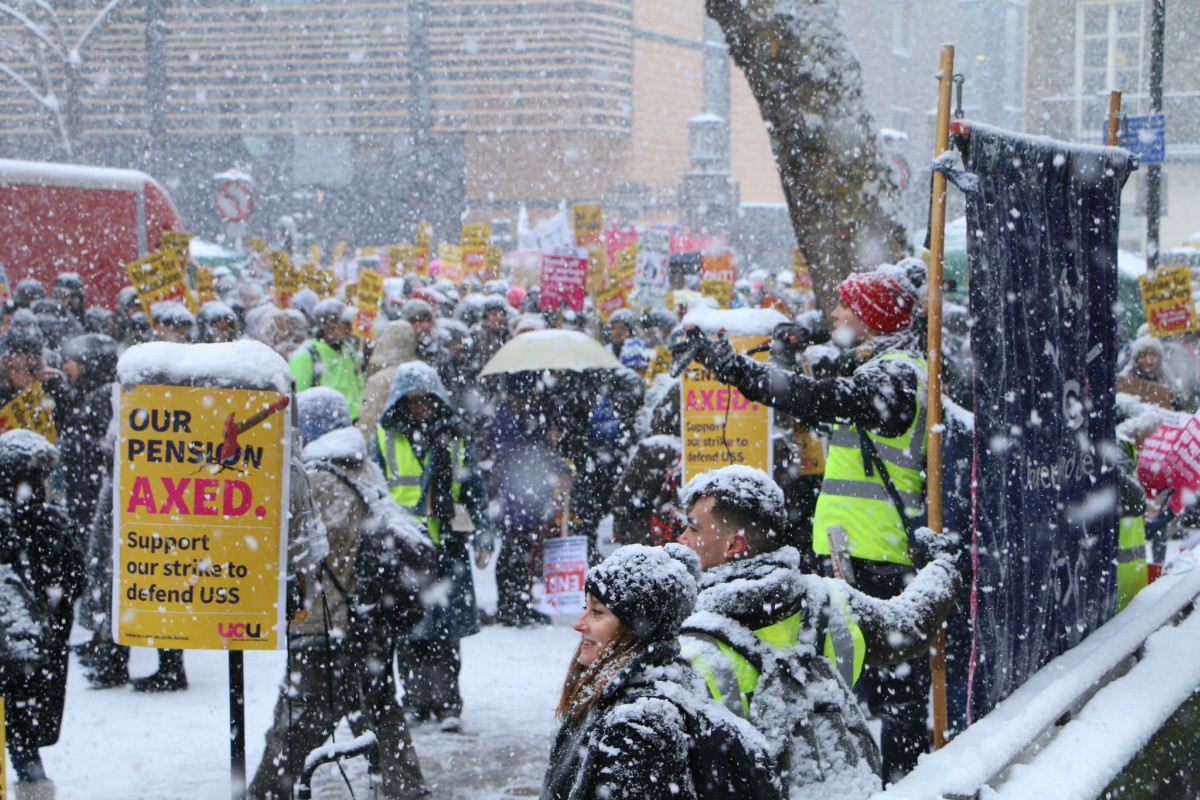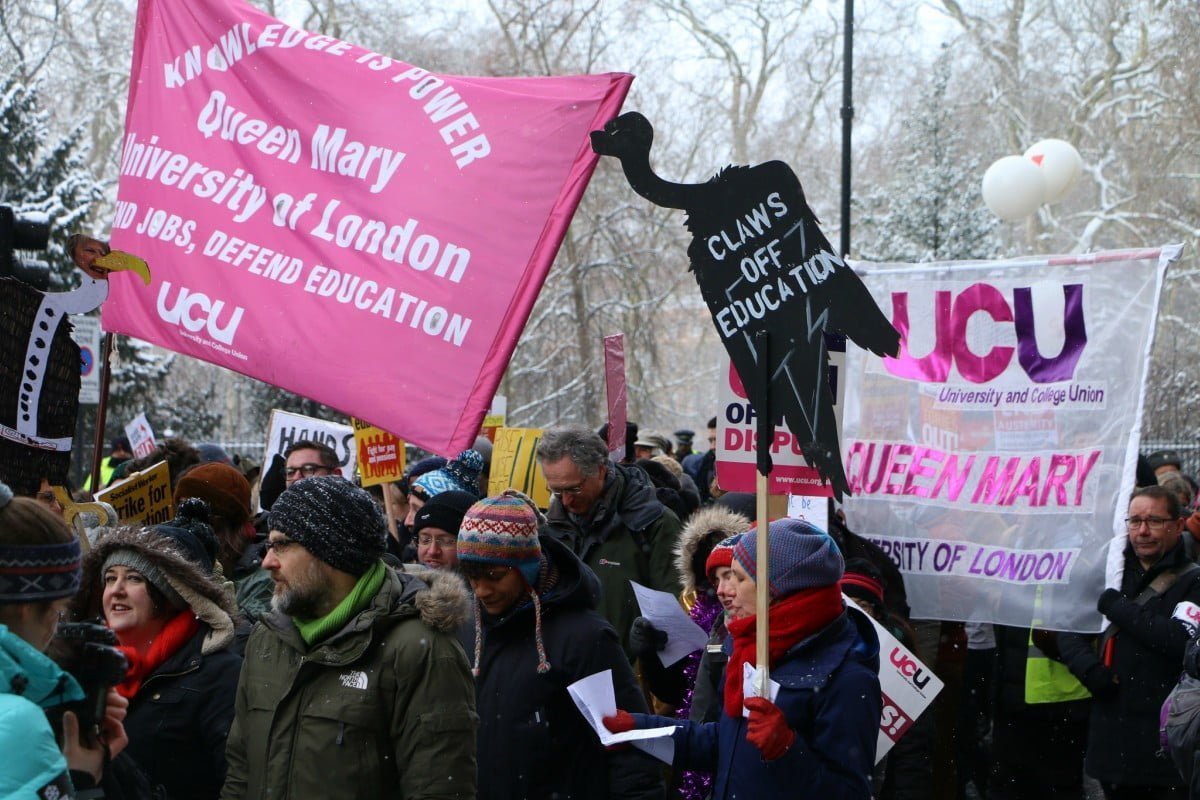Universities face a £2.6bn loss due to the pandemic, which will be made up through attacks on workers. Meanwhile, students are paying through the roof for rent as though nothing has changed.
Universities aren’t entirely sure how they are going to manage the academic year come September. There will most likely be more online meetings, and a slightly distorted ‘freshers’ experience. Beyond that though, many students are racked with uncertainty about what to expect in the autumn. What we do know is that they will be forced to bear the brunt of this crisis, along with the workers on campus.
As the lockdown began, plenty of students made the choice to leave their university and move home. Despite universities being closed, in a number of places such as Nottingham Trent and Bristol, university halls made students pay rent for the full summer term. Students fought back with rent strikes in various places. Looking toward next year, lots of students will be asking themselves – why should I pay to live near campus if my courses are online?
Students tend to find their accommodation over the summer between 1st and 2nd year, with some already being sorted earlier in the year. This means many are already trapped into rent contracts. So far, they seem to be expected to continue paying through the roof to private landlords and university halls as though everything is normal. But nothing is normal. These rent strikes must be coordinated, to become a powerful national movement.
Shocked, I say, shocked, to read private landlords are still demanding rent from students, despite universities shutting down due to the pandemic.
Almost as if they’re driven purely by avarice.
Solidarity with anyone on rent strike. ✊
— Andy Haigh (@Wolverinesclaws) May 16, 2020
Rent is one issue, but there is also the question of fees themselves. The universities are now trying to cobble together courses over the summer months that will translate into online material. By contrast, the Open University took 2 years to develop its latest online courses. But students are now being made to pay £9,000 a year for remote, ill-equipped education.
Fight back
 When the government first raised tuition fees there was a big backlash. Since then, we’ve had 10 years of austerity, cuts, and attacks against Higher Education. The last few years have seen two huge UCU strikes where lecturers have demanded better pay and conditions.
When the government first raised tuition fees there was a big backlash. Since then, we’ve had 10 years of austerity, cuts, and attacks against Higher Education. The last few years have seen two huge UCU strikes where lecturers have demanded better pay and conditions.
Thousands of students stood in solidarity with their lecturers because they understood that their fight was the same. It is the fight for free education. The marketisation of Higher Education has been putting mounting pressure on students and staff for years. COVID-19 is going to exacerbate this pressure.
Why should students pay for this? Why should they leave university with debt, thrown into an impossible job market. The number of people claiming unemployment benefits increased by the most since records began in April to reach almost 2.1 million. Those who are in the process of finishing their degrees are looking at the economy in horror. This generation has experienced nothing but cuts and crisis.
The potential for a fightback is huge, but it needs organisation. The first wave of cuts has already begun amongst staff with the lay off of GTAs. The fact is, universities are facing a loss of £2.6bn due to COVID-19 with thirty thousand jobs at risk. It is not the directors or management who will be losing their jobs.
Therefore the fight for free education must continue, and it must be bold, uncompromising and socialist. The wealth exists in society to do so. We cannot let the Tories make us pay.
University financial crisis: Same old story – austerity for workers, protection for bosses
Lugh Corbett-Martin, Cambridge Marxists
On Thursday 21 May, Cambridge University Vice Chancellor Stephen Toope, in an email to all staff and students, announced that ‘unpalatable options’ might have to come into effect in order for the university to maintain ‘financial sustainability’.
In his email, Toope outlines a new range of burdens to bear down upon the already highly exploited workforce of the University: an extended hiring pause, suspension of promotion and pay progression schemes, a ‘voluntary part-time working scheme’, potential pay freezes and ‘voluntary pay reductions’, and the possibility of generalised redundancies.
In today’s email from Vice-Chancellor Stephen Toope, he announced that “If the reduction of income continues and no government support is forthcoming, we may need to undertake a review of staff pay that might include temporary pay freezes and voluntary pay reductions… pic.twitter.com/LrhFKFqapL
— Cambridge Defend Education (@CamDefendEd) May 22, 2020
Conspicuously absent from this list of horrors is any discussion of the bloated salaries of University management. Cambridge University employs 347 staff members on salaries over £100,000, compared to a sector average of 33 – the combined cost of these salaries comes to around £43 million. Toope himself is the third highest-paid Vice-Chancellor in the country, earning just shy of half a million pounds per year.
For whom are these options unpalatable? Will we see Stephen Toope taking a voluntary pay cut? Will we see management rolling up their sleeves and getting stuck into the voluntary part-time working scheme, cleaning toilets or teaching classes without pay? Unlikely. Despite their crocodile tears, management will keep their bloated salaries and privileges, whilst university staff will be asked, once again, to foot the bill.
All this comes amidst ongoing battles over casualisation, marketisation, and generalised degradation of working conditions for university staff, which led to the UK’s biggest ever university strikes three months ago.
In Cambridge, where many colleges are amongst the richest institutions in the country, only one amongst them pays staff the Living Wage. These workers will be some of the first in the firing line when the crisis comes. In 2018, it was reported that Cambridge University and Colleges had a combined wealth of £11.8bn, up from £9.57bn in 2015. Yet university staff have seen a real terms pay cut of 15% over the last decade, driving thousands into financial hardship
Still, Toope tells staff to tighten their belts. We say no: the wealth of Cambridge and it’s colleges should be put under the control of its entire academic and assistant staff workforce. They can then decide whether cuts to anything but Toope’s inflated salary are really necessary.
These new cuts are a taste of what is to come as the capitalist economy moves into yet another crisis. Both will undoubtedly accelerate the growing inequalities in universities: gender and racial pay gaps, heightened exploitation of an increasingly casualised workforce, and gross income and wealth inequalities between the highest and lowest paid workers.
The only way for workers in the University of Cambridge to fight the degradation of their working conditions is to fight, alongside all workers, for control of the university and the overthrow of the capitalist system.






